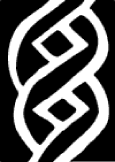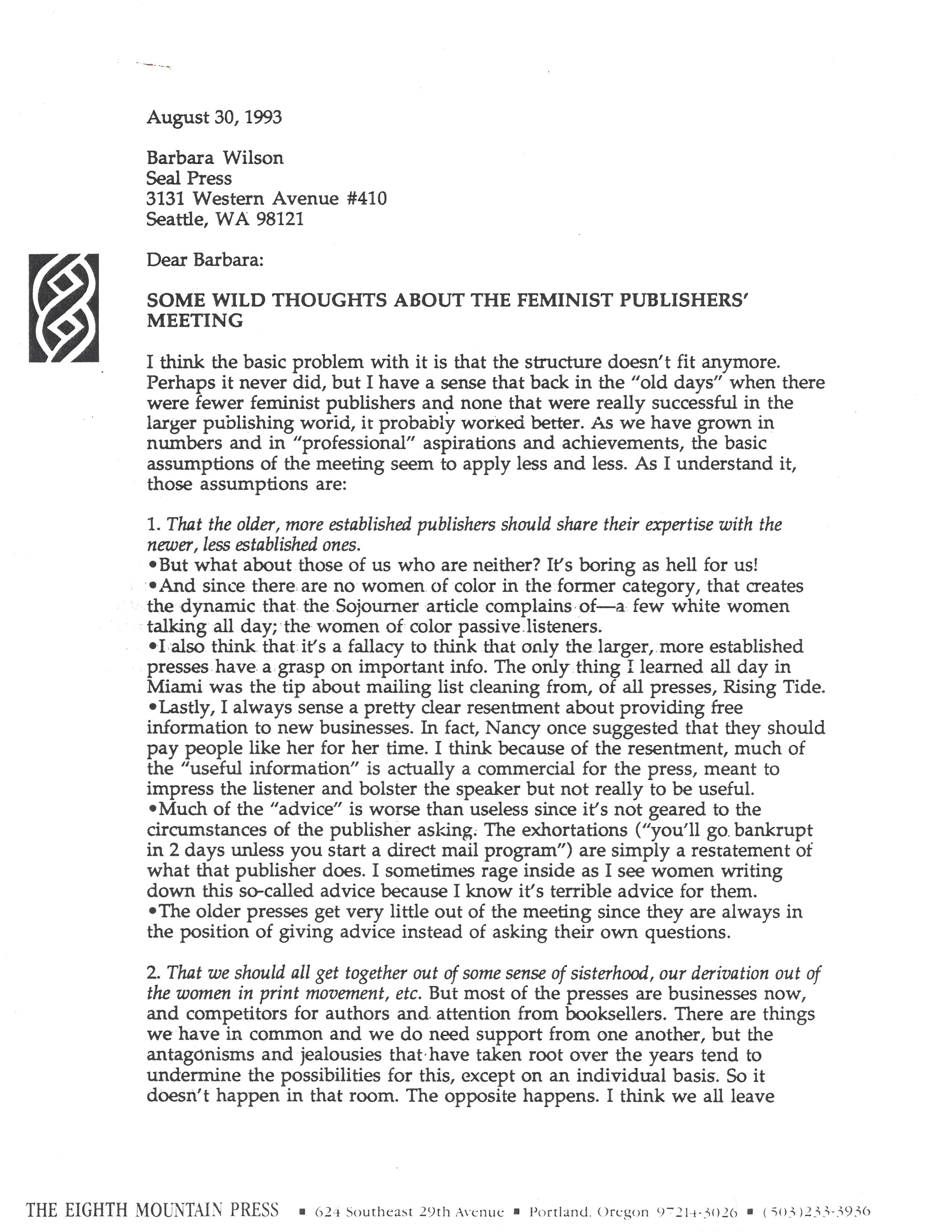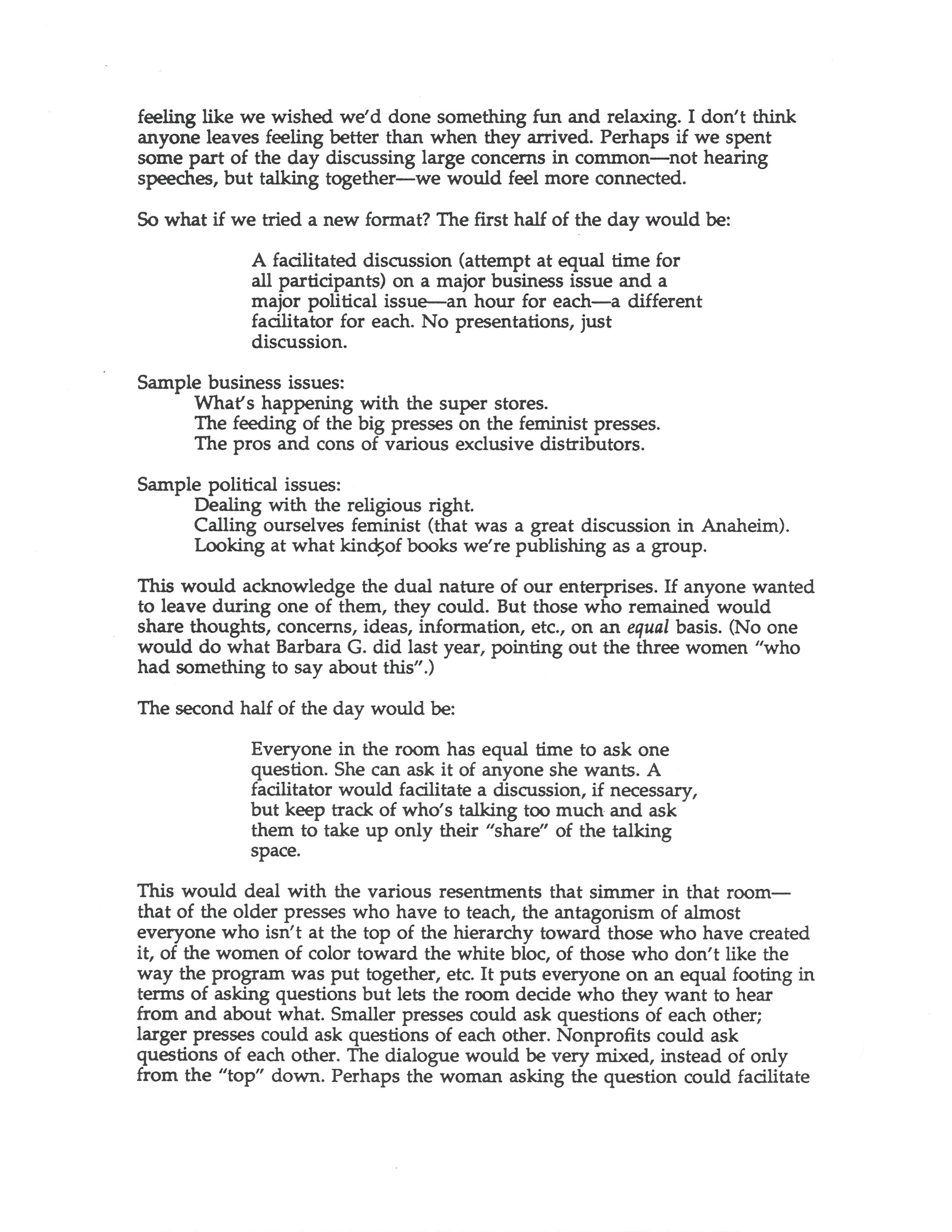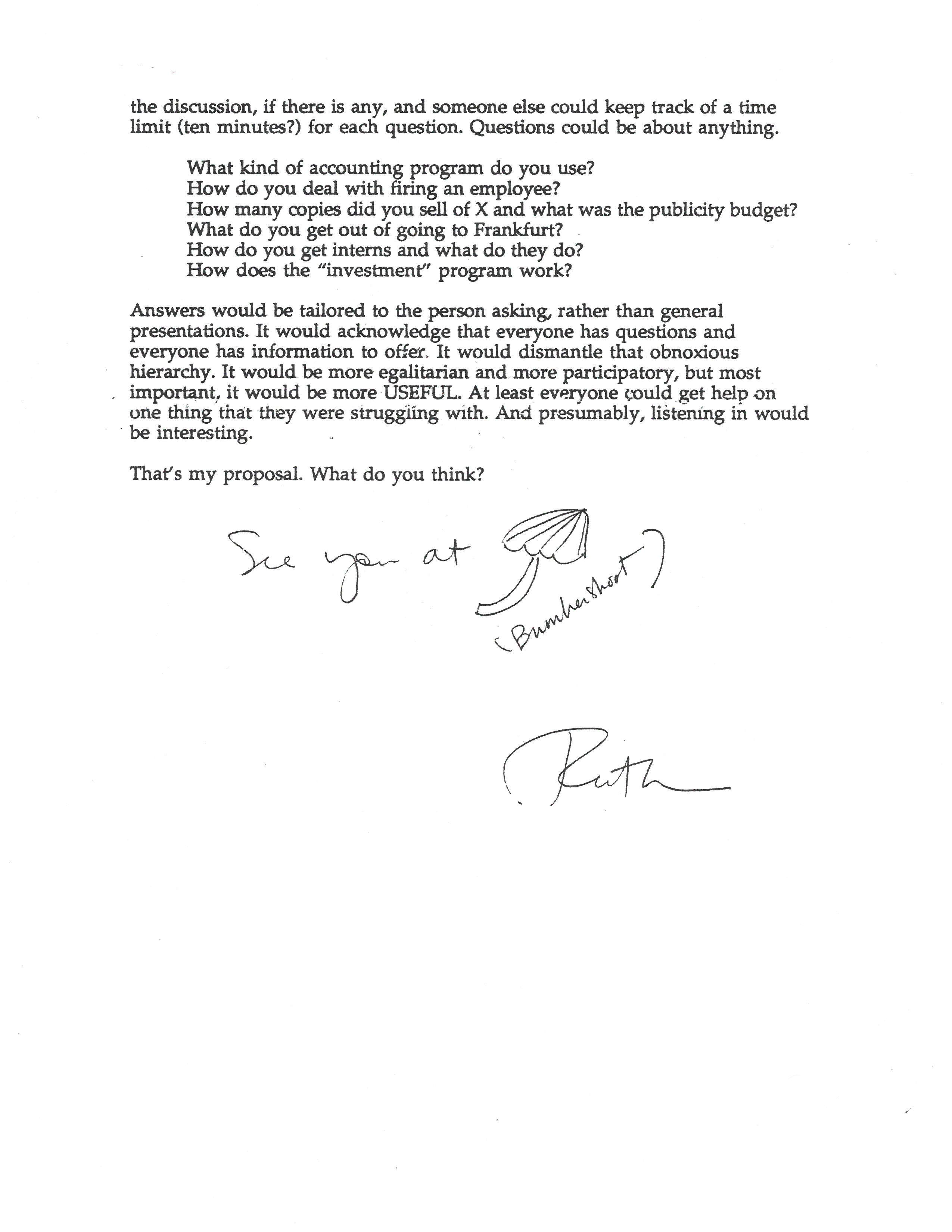|
|
Transcription: August 30, 1993 Barbara Wilson Seal Press 3131 Western Avenue #410 Seattle, WA 98121  (Image: Eighth Mountain Press logo)[7] Dear Barbara:[8] SOME WILD THOUGHTS ABOUT THE FEMINIST PUBLISHERS’ MEETING[9] I think the basic problem with it is that the structure doesn’t fit anymore. Perhaps it never did, but I have a sense that back in the “old days”[10] when there were fewer feminist publishers and none that were really successful in the larger publishing world, it probably worked better. As we have grown in numbers and in “professional” aspirations and achievements, the basic assumptions of the meeting seem to apply less and less. As I understand it, those assumptions are: 1.That the older, more established publishers should share their expertise with the newer, less established ones.
So what if we tried a new format? The first half of the day would be: A facilitated discussion (attempt at equal time for all participants) on a major business issue and a major political issue–an hour for each–a different facilitator for each. No presentations, just discussions. Sample business issues: What’s happening with the super stores.[16] The feeding of the big presses on the feminist presses.[17] The pros and cons of various exclusive distributors. Sample political issues: Dealing with the religious right. Calling ourselves feminist (that was a great discussion in Anaheim)[18] Looking at what kinds of books we’re publishing as a group. This would acknowledge the dual nature of our enterprises. If anyone wanted to leave during one of them, they could. But those who remained would share thoughts, concerns, ideas, information, etc., on an equal basis. (No one would do what Barbara G.[19] did last year, pointing out the three women “who had something to say about this”.) The second half of the day would be: Everyone in the room has equal time to ask one question. She can ask it of anyone she wants. A facilitator would facilitate a discussion, if necessary, but keep track of who’s talking too much and ask them to take up only their “share” of the talking space. This would deal with the various resentments that simmer in that room–that of the older presses who have to teach, the antagonism of almost everyone who isn’t at the top of the hierarchy toward those who have created it, of the women of color toward the white bloc, of those who don’t like the way the program was put together, etc. It puts everyone on an equal footing in terms of asking questions but lets the room decide who they want to hear from and about what. Smaller presses could ask questions of each other; larger presses could ask questions of each other. Nonprofits could ask questions of each other. The dialogue would be very mixed, instead of only from the “top” down. Perhaps the woman asking the question could facilitate the discussion, if there is any, and someone else could keep track of a time limit (ten minutes?) for each question. Questions could be about anything. What kind of accounting program do you use? How do you deal with firing an employee? How many copies did you sell of X and what was the publicity budget? What do you get out of going to Frankfurt?[20] How do you get interns and what do they do? How does the “investment” program work? Answers would be tailored to the person asking, rather than general presentations. It would acknowledge that everyone has questions and everyone has information to offer. It would dismantle that obnoxious hierarchy. It would be more egalitarian and more participatory, but most important, it would be more USEFUL. At least everyone could get help on one thing that they were struggling with. And presumably, listening in would be interesting. That’s my proposal. What do you think? [Handwritten] See you at Bumbershoot[21] [Image: hand-drawn umbrella] [Signed] Ruth[22] Transcribed by Juliet Wayne |
[1] Gundle and Newman’s dates unknown.
[2] When discussing how she chose the title, Barbara Smith writes, “Home Girls. The girls from the neighborhood and from the block, the girls we grew up with. I knew I was onto something, particularly when I considered that so many Black people who are threatened by feminism have argued that by being a Black feminist (particularly if you are also a Lesbian) you have left the race, are no longer a part of the Black community, in short no longer have a home” (Barbara Smith, Home Girls: A Black Feminist Anthology (New York: Kitchen Table: Women of Color Press, 1983), xxii).
[3] Barbara Smith, “A Press of Our Own Kitchen Table: Women of Color Press,” in Frontiers: A Journal of Women’s Studies, Vol. 10, No. 3, Women and Words (1989), pp. 11-13.
[4] In a letter from Ruth Gundle to Faith Conlon on 9 November 1990, she wrote, “Did you see the the write-up about the Eighth Mountain Poetry Prize in The Nation? They compared it very favorably to Barnard’s New Woman Poet Series (the only two poetry prizes for women only in the U. S.), complaining that Barnard’s judges were all white and mostly heterosexual and the winners all sounded alike, whereas The Eighth Mountain Prize…” Gundle doesn’t finish her sentence, but it can be assumed that she was proud of the diversity her press had in both the race and sexuality of their authors (Letter from Ruth Gundle to Faith Conlon, 9 November 1990, Series II, Box 1, File 26: Ruth Gundle Correspondence/Eighth Mountain Press, Seal Press, Oberlin College Special Collections).
[5] Letter from Faith Conlon to Deb Brown, 17 February 1987, Series II, Box 1, File 13, Correspondence: Deb Brown (Cover Design), The Seal Press, Oberlin College Special Collections.
[6] Letter from Ruth Gundle to Faith Conlon, 28 February 1995, Series II, Box 1, File 26: Ruth Gundle Correspondence/Eighth Mountain Press, Seal Press, Oberlin College Special Collections.
[7] See image.
[8] Barbara Wilson (b. 1950) was the founder and editor of Seal Press. Wilson organized the 1993 and 1994 Pre-ABA Feminist Publishers’ Meeting in Miami, Florida and Los Angeles, California (respectively) along with Holly Morris, the Editorial Director of Seal Press and Felice Newman, founder of Cleis Press. (Series I, Box 9, Folder 6, Seal Press, Oberlin College Special Collections)
[9] The Feminist Publishers’ Meeting was an annual conference held at the American Booksellers Association Trade Show.
[10] The first Feminist Publishers’ Meeting was an informal gathering of feminist booksellers in L.A. on May 27, 1988. Carol Seajay, founder of Feminist Bookstore News, organized the event at the request of feminist publishers who attended the ABA conference in Washington, DC of the previous year.
[11] Sojourner was a national feminist periodical that operated in Cambridge, Massachusetts from 1975 to 2002.
[12] Rising Tide Press, founded in 1992, published lesbian fiction focused in mystery, science-fiction/fantasy, and romance genres.
[13] Nancy Bereano, founder of Firebrand Books (1984). At the 1993 conference, Bereano led a session called, “Advertising/Direct Mail Marketing” with Barbara Grier (b. 1933-2011), and “Inbook Reprise” with Felice Newman (b. 1956).
[14] Direct mail is a marketing effort that uses a mail service to deliver a promotional printed piece to your target audience.
[15] Women in Print was a network of independent feminist publishers, journals, bookstores, and conferences that developed out of lesbian and feminist literary activism in the 1960s.
[16] This most likely refers to bookstore giants like Barnes and Noble.
[17] Feminist presses believed their work created a market for corporate presses to feed on. The majority of the literary work released by feminist presses wasn’t met with commercial success, but the work that did was quickly bought up and reprinted by larger presses. Corporate publishers could promise widespread distribution and better pay but sometimes the writers and presses who chose to work with these companies were known as “sell outs.” In a letter to Faith Conlon of Seal Press, Evelyn C. White shares an idea for a book she considered writing about her transgender friend; she does not specify Seal Press as the best place for its publication, but that a feminist press would be likely. This speaks to the fringe nature of what feminist presses published relative to what mainstream companies did (Letter from Evelyn C. White to Faith Conlon, 3 February 1991, Series II, Box 1, File 33, Correspondence: Evelyn White (1986-1989), The Seal Press, Oberlin College Special Collections).
[18] Anaheim, California, was the location of the 1988 ABA trade show.
[19] Barbara Grier of Naiad Press Inc. In 1993, Naiad described itself as, “The oldest and largest lesbian publishing company in the world.” At the conference the same year, Grier led a session called “Buying Trends and the Impact of Superstores,” and “Advertising/Direct Mail Marketing” with Nancy Bereano. This comment was mentioned in a number of letters addressed to the Feminist Publishers’ steering committee.
[20] The Frankfurt Book Fair (Frankfurt, Germany).
[21] Bumbershoot Literary Arts Festival (Seattle, Washington).
[22] Ruth Gundle of The Eighth Mountain Press. Eighth Mountain, founded in 1985, published one travel book geared towards women and one literary work each year. In 1994, Ruth Gundle moderated a session called “Is ABA Necessary?”


